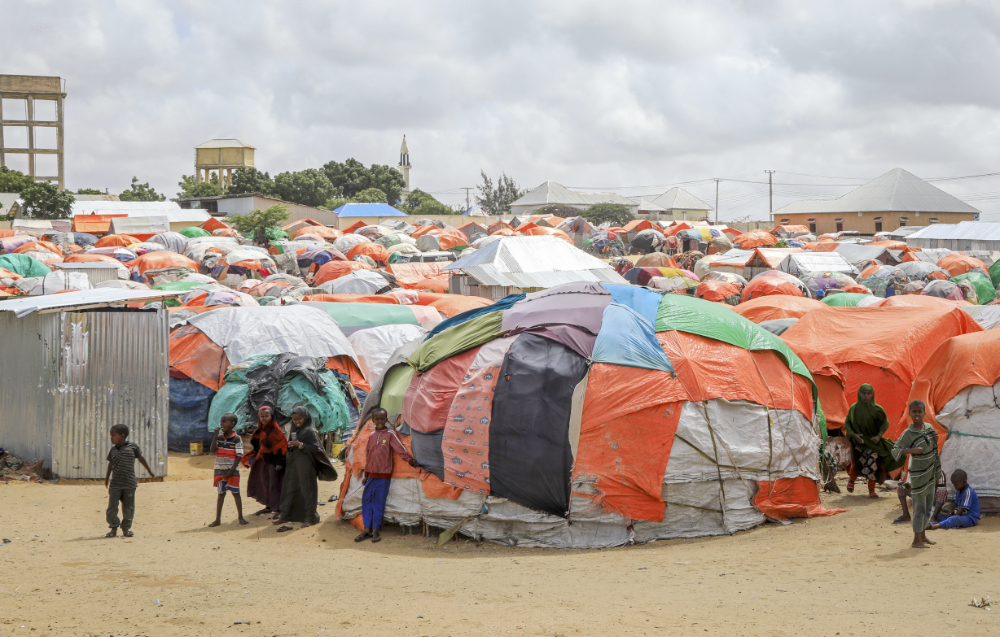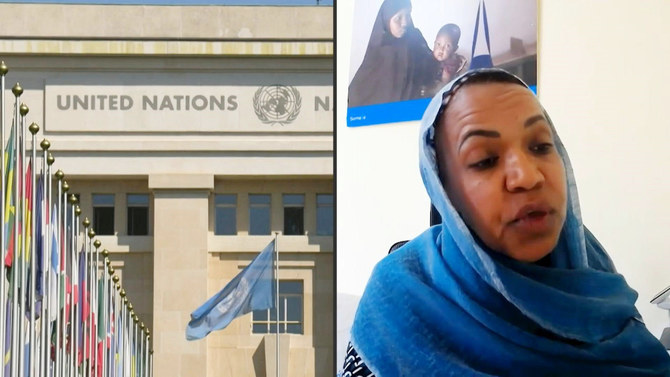DULLES, Virginia: The Trump administration on Monday welcomed a group of 59 white South Africans as refugees, saying they face discrimination and violence at home, which the country’s government strongly denies.
The decision to admit the Afrikaners also has raised questions from refugee advocates about why they were admitted when the Trump administration has suspended efforts to resettle people fleeing war and persecution who have gone through years of vetting.
Many in the group from South Africa — including toddlers and other small children, even one walking barefoot in pajamas — held small American flags as two officials welcomed them to the United States in an airport hangar outside Washington. The South Africans were then leaving on other flights to various US destinations.
A group of 49 Afrikaners had been expected, but the State Department said Monday that 59 had arrived.
“I want you all to know that you are really welcome here and that we respect what you have had to deal with these last few years,” Deputy Secretary of State Christopher Landau said.
President Donald Trump told reporters earlier Monday that he’s admitting them as refugees because of the “genocide that’s taking place.” He said that in post-apartheid South Africa, white farmers are “being killed” and he plans to address the issue with South African leadership next week.
That characterization has been strongly disputed by South Africa’s government, experts and even the Afrikaner group AfriForum, which says farm attacks are not being taken seriously by the government.
South Africa’s government says the US allegations that the white minority Afrikaners are being persecuted are “completely false,” the result of misinformation and an inaccurate view of the country. It cited the fact that Afrikaners are among the richest and most successful people in the country.
The view from South Africa
Speaking at a business conference in Ivory Coast, South African President Cyril Ramaphosa said Monday that he spoke with Trump recently and told him his administration had been fed false information by groups who were casting white people as victims because of efforts to right the historical wrongs of colonialism and South Africa’s previous apartheid system of forced racial segregation, which oppressed the Black majority.
“I had a conversation with President Trump on the phone and he asked me, ‘What’s going on down there?’ and I told him that what you are being told by those people who are opposed to transformation back in South Africa is not true,” Ramaphosa said.
Afrikaners make up South Africa’s largest white group and were the leaders of the apartheid government, which brutally enforced racial segregation for nearly 50 years before ending it in 1994. While South Africa has been largely successful in reconciling its many races, tensions between some Black political parties and some Afrikaner groups have remained.
The Trump administration has falsely claimed white South Africans are having their land taken away by the government under a new expropriation law that promotes “racially discriminatory property confiscation.” No land has been expropriated.
Trump has promoted the allegation that white farmers in South Africa are being killed on a large scale as far back as 2018 during his first term.
Conservative commentators have promoted the allegation about a genocide against white farmers, and South African-born Trump ally Elon Musk has posted on social media that some politicians in the country are “actively promoting white genocide.”
South Africa has extremely high levels of violent crime, and white farmers have been killed in rural Afrikaner communities. It has been a problem for decades. The government condemns those killings but says they are part of the country’s problems with crime.
“There is no data at all that backs that there is persecution of white South Africans or white Afrikaners in particular who are farmers,” South African Foreign Minister Ronald Lamola said Monday. “White farmers get affected by crime just like any other South Africans who do get affected by crime. So this is not factual, it is without basis.”
Trump administration says white South Africans have been targeted
Landau said many of those who arrived Monday experienced “threatening invasions of their homes, their farms and a real lack of interest or success of the government in doing anything about this situation.”
They all had met stringent vetting standards, including the ability to assimilate into American culture, Landau said. Critics of the refugee program suggest that refugees aren’t properly vetted, though supporters say they go through some of the strictest vetting of anyone seeking to come to America.
Trump indefinitely suspended the refugee resettlement program — which historically had widespread bipartisan support — on his first day in office. A month later, he announced a plan to resettle white South African farmers and their families as refugees.
Supporters of the refugee program question how the administration can justify admitting this small group while keeping out others from conflict zones around the world.
Sen. Jeanne Shaheen, a New Hampshire Democrat, called it an effort to “rewrite history.”
“The Administration must clarify why these individuals qualify for refugee status and resettlement in the US and why they have been prioritized over refugees like Afghans, Burmese Rohingya and Sudanese who have fled their homes due to conflict and persecution,” she said in a statement Monday.
Who can come from South Africa under Trump’s order
According to the US Embassy in South Africa, applicants have to be South African citizens who are of Afrikaner ethnicity or a member of a racial minority, and they have to be able to show a history of or a fear of persecution.
Afrikaners, who are the descendants of mainly Dutch and French colonial settlers, number around 2.7 million among South Africa’s population of 62 million, which is more than 80 percent Black.
The US refugee program was created by Congress in 1980, and groups have sued to restart it after Trump’s halt.
Traditionally, to qualify as a refugee, applicants must demonstrate a well-founded fear of persecution due to race, religion, nationality, membership in a particular social group, or political opinion. Refugees are distinct from asylum-seekers because refugees must be outside of the US to qualify.
A network of resettlement agencies generally helps refugees settle in their new homes, and they get 90 days of federal assistance for things like rent. The Episcopal Church’s migration service, however, is refusing a directive from the federal government to help resettle the white South Africans, citing the church’s longstanding “commitment to racial justice and reconciliation.”





























